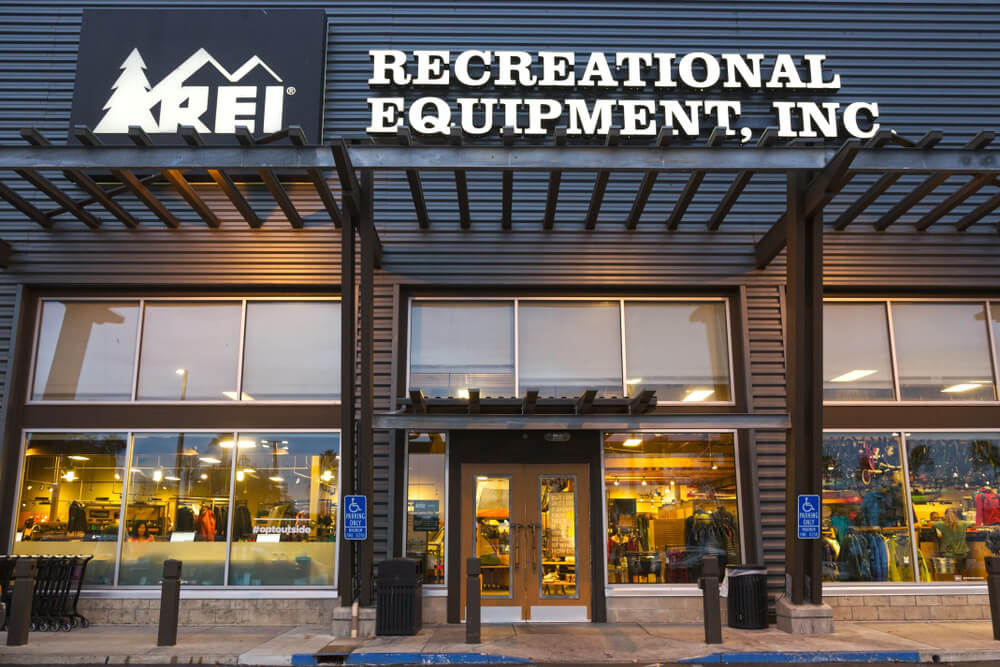REI, short for Recreational Equipment, Inc., stands as an iconic and influential force in the world of outdoor recreation and retail. This American cooperative, founded in 1938, has a rich history intertwined with the passion for outdoor adventure and a strong commitment to fostering a sustainable and environmentally responsible approach to business.
REI (Recreational Equipment, Inc.) is an American outdoor recreation cooperative that sells a variety of outdoor equipment, clothing, and footwear. The company was founded in 1938 by Lloyd and Mary Anderson in Seattle, Washington. REI has over 170 stores in the United States and Canada. The company also operates an online store. REI is a member-owned cooperative, which means that its customers are also its owners.

REI’s journey began with the vision of a small group of mountaineers who were driven by their shared love for the great outdoors. What started as a modest cooperative has since grown into a major player in the outdoor retail industry. Today, REI is celebrated for its extensive selection of high-quality outdoor gear, clothing, and equipment, catering to a diverse community of outdoor enthusiasts, from casual hikers to seasoned mountaineers.
What truly sets REI apart is its unique cooperative model. Unlike traditional corporations, REI is owned by its customers – outdoor enthusiasts who become members and have a say in the company’s operations. This distinctive approach aligns with REI’s mission to inspire, educate, and outfit people for a lifetime of outdoor adventure.
Moreover, REI is a trailblazer in promoting sustainability and responsible business practices within the outdoor industry. Their commitment to environmental stewardship extends from the products they sell to the places they play. They advocate for preserving natural landscapes, reducing their carbon footprint, and promoting diversity, equity, and inclusion in outdoor spaces.
Here are some of the reasons why REI is so successful:
- Commitment to sustainability: REI is committed to environmental sustainability. The company has a number of initiatives in place to reduce its environmental impact, such as using recycled materials and donating used equipment to non-profits.
- Commitment to customer service: REI is committed to customer service. The company has a reputation for being knowledgeable and helpful, and it offers a satisfaction guarantee on all of its products.
- Wide selection of products: REI offers a wide selection of outdoor equipment, clothing, and footwear. The company has something for everyone, from casual hikers to hardcore mountaineers.
- Member-owned cooperative: REI is a member-owned cooperative, which means that its customers are also its owners. This gives customers a sense of ownership and pride in the company.
- Strong brand: REI has a strong brand that is associated with quality, sustainability, and customer service. This brand recognition helps to attract new customers and retain existing ones.
REI is a company that is committed to making the outdoors accessible to everyone. The company’s products, services, and initiatives are designed to help people enjoy the outdoors and connect with nature. With its commitment to sustainability, customer service, and quality, REI is sure to continue to be a leader in the outdoor recreation industry for many years to come.
Founding History of REI
The founding history of REI (Recreational Equipment, Inc.) is a testament to the passion for outdoor adventure and the spirit of cooperation. REI’s roots can be traced back to the early 1930s when a group of mountaineers in the Pacific Northwest, particularly in the Seattle area, began coming together over their shared love for the outdoors.
In 1932, a group of 23 climbing friends in Washington state established the Pacific Northwest’s first climbing club, called the “The Co-operative.” The founders included accomplished climbers and outdoor enthusiasts such as Lloyd and Mary Anderson, who played pivotal roles in the early development of REI.
This tight-knit community of climbers faced challenges in obtaining quality outdoor gear for their expeditions. They decided to pool their resources and place a collective order for ice axes from Europe. This marked the beginning of their cooperative efforts to source outdoor equipment and gear more affordably.
On January 4, 1938, the founders officially incorporated REI as a consumer cooperative. The name, Recreational Equipment, Inc., was chosen to reflect the cooperative’s mission of providing high-quality recreational gear to its members at reasonable prices. It was envisioned as a way to give outdoor enthusiasts access to the best equipment available while fostering a sense of community.
In its initial years, REI faced several challenges. World War II disrupted the availability of outdoor equipment, and the cooperative struggled to keep its operations running. Despite these challenges, REI’s commitment to its cooperative model remained unwavering.
As the post-war era ushered in a renewed interest in outdoor activities, REI grew steadily. The cooperative expanded its product offerings beyond climbing gear to include a wide range of outdoor equipment and clothing. By the 1950s and 1960s, it had become a reputable supplier of outdoor gear.
REI’s cooperative membership structure allowed individuals to become co-owners of the company by purchasing a lifetime membership share. This unique model contributed to a sense of community among outdoor enthusiasts and gave them a voice in the cooperative’s decision-making process.
Throughout its history, REI has adhered to its founding principles of quality, service, expertise, and respect for the environment. These principles have guided the company’s growth and shaped its identity.
Today, REI stands as one of the most prominent and influential outdoor retail cooperatives in the United States. It is celebrated not only for its extensive range of outdoor products but also for its commitment to sustainability, environmental stewardship, and fostering a love for the outdoors. REI’s founding history exemplifies how a shared passion for adventure and the cooperative spirit can lead to the creation of an iconic institution that continues to inspire outdoor enthusiasts worldwide.
Marketing Strategies of REI
REI has employed several marketing strategies over the years to establish itself as a leading retailer in the outdoor and recreational industry. These strategies have allowed the company to connect with its target audience effectively and reinforce its brand identity centered around outdoor adventure, sustainability, and community. Here are the key marketing strategies employed by REI:
1. Cooperative Model
REI employs cooperative models as one of its marketing strategies because it aligns well with the company’s values and mission. By emphasizing member ownership and community engagement, REI positions itself as a unique retail experience that goes beyond simply selling products.
Here’s how REI implements the cooperative model as a marketing strategy:
Emphasis on Member Ownership: At the core of REI’s cooperative approach lies its membership program. Customers can become members by paying $30 annually for access to discounts, exclusive sales, and other perks. By becoming members, customers feel invested in the brand and take pride in supporting a business committed to environmental conservation and outdoor recreation advocacy.

Community Engagement: REI organizes regular events and activities designed to connect members and non-members alike through shared interests in the outdoors. Activities range from guided hikes and bike rides to classes on campfire cooking and knot tying. These events not only promote REI’s product offerings but also foster a sense of belonging among participants.
Exclusive Access to Products and Services: REI offers members early access to select merchandise and services, creating a sense of privilege and prestige associated with being part of the cooperative. Additionally, members receive personalized communications tailored to their preferences and purchase histories, strengthening relationships between customers and the brand.
Environmental Stewardship: REI leverages its commitment to sustainability and conservation as another element of its cooperative model. Through initiatives like the #OptToAct campaign, REI motivates members to make small changes that positively impact the environment. This focus resonates with many customers seeking companies that align with their own values.
Annual Dividends: REI distributes dividends to eligible members based on their purchases throughout the year. While the amount varies each year, the distribution serves as a reminder that REI remains accountable to its members and rewards them for their loyalty. The cooperative structure ensures that profits are distributed equitably rather than solely benefiting investors or executives.
2. Educational Content
REI uses educational content as a marketing strategy to establish authority and expertise in the outdoor gear and apparel space. By providing valuable information and resources related to outdoor experiences, REI attracts potential customers interested in exploring nature and encourages existing ones to deepen their relationship with the brand. Here’s how REI utilizes educational content as a marketing strategy:
Knowledge Hub Website Section: REI maintains a section called “Knowledge Hub” on its website, which features articles, videos, and tutorials covering topics relevant to outdoor enthusiasts. From basic skills like packing a backpack correctly to advanced techniques like winter camping, this resource center helps novices start their adventures confidently and keeps experienced explorers informed about new trends and best practices.
Guidance on Gear Selection: To help customers choose appropriate equipment for their desired activities, REI provides detailed product descriptions, user reviews, and comparison charts on its website. Staff experts also provide guidance via phone or email consultations or in-store appointments. This level of assistance instills trust in REI’s ability to match individuals with suitable gear and enhances customer satisfaction when they ultimately make a purchase.
Event Calendar: REI shares an extensive event calendar featuring local and national opportunities for outdoor excursions. Whether it’s a nearby hike led by a park ranger or a multi-day trek across the Rocky Mountains, these events inspire customers to explore nature and create memorable experiences. By highlighting these occasions, REI demonstrates its commitment to helping customers discover the beauty of the great outdoors.
3. Sustainability Initiatives
REI has long been known for its commitment to sustainability and environmental conservation efforts in the outdoor recreation industry. The company has implemented various initiatives aimed at reducing their impact on the environment while promoting responsible use of natural resources.
One such initiative is REI’s “Sustainable Product Standards,” which ensure that products sold by the company meet certain criteria related to environmental performance and social responsibility. This includes using materials from sustainably managed sources, minimizing waste during production processes, and ensuring fair labor practices throughout the supply chain.
Another key aspect of REI’s sustainability initiatives is its support for conservation organizations and advocacy groups working towards protecting public lands and preserving wilderness areas. Through partnerships with non-profit organizations like the National Park Foundation and the Outdoor Alliance, REI helps fund projects that promote access to nature, habitat restoration, and education programs focused on appreciation and stewardship of our natural heritage.
In addition, REI actively engages customers through educational content and events designed to inspire people to get outside and enjoy nature responsibly. By emphasizing the importance of sustainable practices when enjoying the outdoors, REI encourages individuals to adopt eco-friendly habits and make positive contributions to the health of our planet.
4. Community Engagement
REI recognizes the power of community engagement as an effective marketing strategy for building customer loyalty and driving sales growth. Here are some ways they leverage this approach:
Co-op Membership Program: REI offers a cooperative membership program where members receive discounts on purchases, access to exclusive deals, and opportunities to participate in local activities organized by store teams. By fostering a sense of belonging among members, REI creates a strong emotional connection between customers and the brand.
Store Events & Activations: REI stores host regular workshops, classes, and events centered around outdoor activities such as hiking, camping, climbing, etc. These events provide valuable information and hands-on experiences that help customers build confidence and skills necessary to pursue outdoor adventures. They also create opportunities for customers to connect with one another and share their love of the outdoors.

Social Media Presence: REI maintains active profiles across multiple social media platforms including Instagram, Facebook, Twitter, and YouTube. Their content focuses on sharing tips, gear reviews, destination guides, and user-generated content featuring REI products in action. By showcasing how others incorporate REI into their lives, they encourage followers to do the same.
Ambassador Program: REI selects ambassadors who embody the values and spirit of the brand and represent them online and offline. These influencers share their personal stories, product recommendations, and expert advice via blog posts, videos, and social media channels. By aligning themselves with these passionate enthusiasts, REI strengthens relationships with existing customers and attracts new ones seeking authenticity and credibility.
5. Partnerships and Collaborations
REI leverages strategic partnerships and collaborations as part of its overall marketing strategy to expand reach, enhance brand reputation, and drive business results. Here are some examples:
Non-Profit Organizations: REI works closely with several non-profits dedicated to protecting public lands, preserving wilderness areas, and increasing access to outdoor spaces. For instance, REI supports the National Park Conservation Association (NPCA) through donations and volunteer efforts to restore park trails and facilities. By partnering with NPCA, REI demonstrates its commitment to conserving the natural environments it serves.
Brand Collaborations: REI frequently collaborates with complementary brands to offer unique products or services that appeal to shared target audiences. For example, REI teamed up with Trek Bikes to develop bike tours and rentals available exclusively at select REI locations. Similarly, REI joined forces with Subaru to launch the #OptOutside campaign encouraging families to spend time together exploring the great outdoors instead of shopping on Black Friday.
Content Creators and Influencers: REI partners with popular outdoor photographers, writers, and videographers to produce compelling storytelling content highlighting REI products and services. These creators often feature REI gear in their content, providing organic endorsements and authentic testimonials that resonate with target audiences.
6. Omnichannel Strategy
REI seamlessly integrates its online and offline channels. Customers can research products online, make purchases in physical stores, and access detailed product information and reviews through the website or mobile app.
Here’s how REI implements an omnichannel strategy as a marketing strategy:
Seamless Shopping Experience: Customers can shop online or visit a nearby store without any disruption in service or inventory availability. The REI website allows users to search items available both in-store and online, making it easy for shoppers to find what they need regardless of channel preference.
Personalized Communications: REI uses data analytics to segment customers based on purchase history, interests, and preferences. Email communications tailored to individual needs keep subscribers engaged and informed about relevant promotions, events, and product releases.
Mobile App Integration: The REI mobile app provides features such as trail maps, weather updates, and trip planning tools to assist customers during their outdoor excursions. Users can also scan barcodes to view detailed product descriptions and pricing while browsing in-store merchandise.
Inventory Management Optimization: REI optimizes inventory management processes across channels to ensure accurate stock levels and avoid overselling products. This ensures customers can easily locate desired items whether shopping online or in-person.
Consistent Visual Identity: REI maintains a consistent visual identity across all channels using high-quality imagery and color schemes reflecting its core values of quality, durability, and environmental responsibility. This consistency reinforces the brand message and builds trust with customers.
This omnichannel approach provides convenience and enhances the overall shopping experience.
7. Personalization
REI leverages customer data to personalize its marketing efforts. Here’s how REI utilizes personalization as a marketing strategy:
Segmented Email Campaigns: REI sends targeted emails to different segments of its audience based on past purchases, interests, location, and more. Each email contains personalized product recommendations and event invitations tailored to each recipient’s preferences.
Dynamic Product Recommendations: On the REI website, visitors receive automated suggestions for related products, similar items, or complementary pieces based on their current browsing session or previous interactions with the site.
Targeted Social Media Advertising: REI employs social media advertising tactics to display ads only to people who have previously interacted with the brand or shown interest in certain categories. This helps reduce wasted impressions and increases conversions by showing ads to those most likely to engage with the brand.
Loyalty Program Personalization: Members of the REI Co-op loyalty program receive exclusive benefits tailored to their interests and activity within the program. As members accumulate points, they unlock rewards such as early access to sales, free shipping, and special discounts on selected items.
Event Invites Based on Preferences: REI sends personalized event invitations to customers based on their preferred activities, skill level, or local proximity. These curated invitations increase attendance rates and help build stronger connections between the brand and its community.
This includes tailored email campaigns, product recommendations, and special offers based on individual preferences and purchase history.
In summary, REI’s marketing strategies focus on building a sense of community, fostering trust through education and sustainability efforts, and aligning with the values and interests of its target audience. Through these strategies, REI has successfully positioned itself as a trusted brand for outdoor enthusiasts while contributing to the promotion of outdoor recreation and environmental conservation.
Marketing Mix of REI
REI (Recreational Equipment, Inc.) has developed a comprehensive marketing mix that allows it to excel in the outdoor and recreational retail industry. The marketing mix, often referred to as the 4Ps, consists of Product, Price, Place, and Promotion. Here’s an in-depth look at how REI manages each element of its marketing mix:
Product
-
- Wide Product Range: REI offers a vast array of outdoor products, including outdoor gear, apparel, footwear, camping equipment, bikes, and accessories. Its product range caters to various outdoor activities, from hiking and camping to cycling and snow sports.
- Private Label Brands: REI has developed its private label brands like REI Co-op, which offer a range of high-quality outdoor gear and apparel. These brands are trusted by customers and reflect REI’s commitment to quality and value.
- Eco-Friendly Products: The company emphasizes sustainability by offering eco-friendly products. This includes items made from sustainable materials, products with reduced environmental impact, and gear designed for longevity and durability.
Price
-
- Value-Oriented Pricing: REI offers competitive prices that align with its cooperative model. Members can take advantage of annual dividends and exclusive discounts, providing extra value to its customers.
- Price Matching: REI offers a price-match guarantee, ensuring that customers receive the best prices available. This strategy helps retain customer trust and loyalty.
- Membership Benefits: REI’s membership program offers a one-time fee with numerous benefits, such as access to member-only sales, special promotions, and the annual dividend, which is a percentage of their annual spending. This encourages customer retention and loyalty.
Place
-
- Retail Stores: REI operates a network of retail stores across the United States, where customers can interact with products, receive expert advice, and make purchases. The in-store experience aligns with the brand’s commitment to outdoor adventure.
- E-commerce: REI has a robust online presence, allowing customers to browse and shop for products on its website and mobile app. The online platform also provides valuable resources, product information, and customer reviews.
- Omnichannel Integration: REI seamlessly integrates its physical and digital channels. Customers can shop online and pick up products in-store, making returns and exchanges hassle-free. This omnichannel approach enhances the overall shopping experience.
Promotion
-
- Educational Content: REI creates and shares a wealth of educational content through its website, blog, and social media channels. This content includes articles, videos, and expert advice on outdoor activities and gear. It positions REI as an authority in the outdoor industry and builds trust with customers.
- Sustainability Initiatives: REI promotes its commitment to sustainability through various initiatives, such as Opt to Act and store closures on Black Friday. These actions resonate with environmentally conscious consumers and garner positive media attention.
- Community Engagement: REI actively engages with the outdoor community through social media, events, and partnerships. The #OptOutside campaign, encouraging people to spend time outdoors on Black Friday, exemplifies this community-focused approach.
- Partnerships: REI collaborates with organizations, nonprofits, and brands that share its values. These partnerships extend its reach and support causes related to outdoor recreation and environmental conservation.
In conclusion, REI’s marketing mix is characterized by a diverse product range, competitive pricing, a strong retail presence, and a strategic promotional approach that emphasizes education, sustainability, and community engagement. This holistic marketing mix contributes to REI’s success in catering to outdoor enthusiasts and promoting its cooperative model and brand values.
Also Read: Marketing Strategies and Marketing Mix of Decathlon
To read more content like this, subscribe to our newsletter




